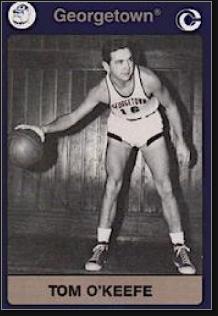
Sport: Basketball
Born: June 3, 1928
Died: October 18, 2015
Town: Jersey City, New Jersey
Thomas Vincent O’Keefe was born June 3, 1928 in Jersey City, NJ He was one of five children born to Veronica and Michael O’Keefe. Tough, coordinated and muscular, Tommy was a good all-around athlete who made a name for himself in the parks and playgrounds of Jersey City. He became a star backcourt player for St. Peter’s Prep, which sent a number of players to Georgetown in the postwar era.
Tommy, however, wanted to play for Elmer Ripley at Notre Dame and committed to the school. As luck would have it, Ripley left Notre Dame for a job with the Hoyas—and O’Keefe followed. By his junior season, Tommy was part of a three-guard rotation that included Danny Kraus and Ray Corley, and led the team in scoring in 1947–48. He was also the top scorer as a senior the following season and then, due to a quirk in freshman eligibility rules, was allowed to play a fifth year, which was technically only his fourth varsity season. He was the Hoyas’ top scorer once again and was selected along with Bob Cousy at the guard position for the 1950 East-West All-Star Game. Tommy was the first Hoya to surpass 1,000 career points.
Tommy was taken in the fourth round of the 1950 NBA Draft by the Washington Capitals, who promptly folded, and then played a handful of games for the Baltimore Bullets in what would be his only pro season. Tommy’s career was interrupted in 1951 by the Korean War. He coached service basketball during his stint in the Army and decided he could make a career of coaching.
Tommy worked for the FBI and coached briefly at Gonzaga before returning to Georgetown as freshman coach and as an assistant under Tom Nolan. He replaced Nolan in 1960–61 and coached the Hoyas through the 1965–66 season. Among his star players were a couple of Jersey boys: future NFL Commissioner Paul Tagliabue and sharpshooter Jim Barry. Tommy’s greatest moment came two days after Christmas in 1963, when the Hoyas upended defending national champion Loyola.
In the pre-Big East days, the Georgetown coaching job didn’t pay enough for Tommy to make a decent living. Throughout his coaching career, he worked in sales, and continued to do so until he retired across the river to Alexandria, Virginia. He was honored along with other Hoya greats during a halftime ceremony in 2014. He passed away the following year.